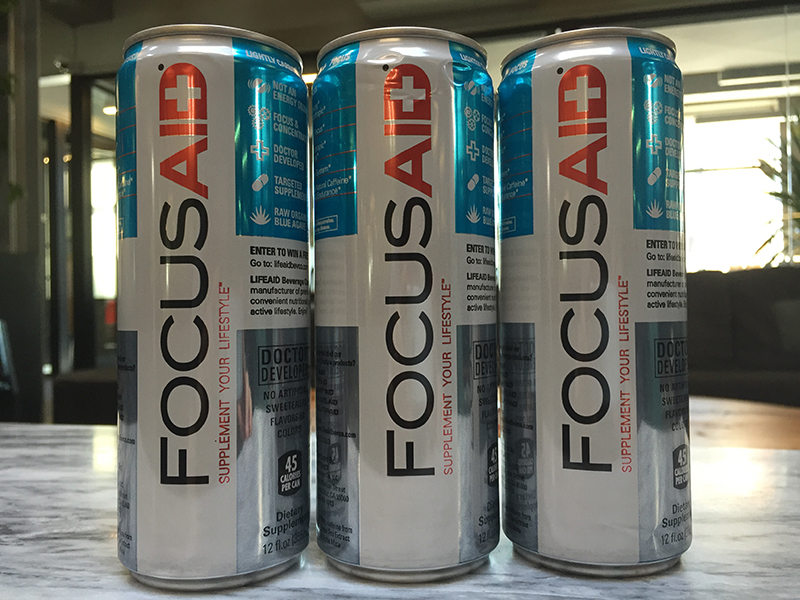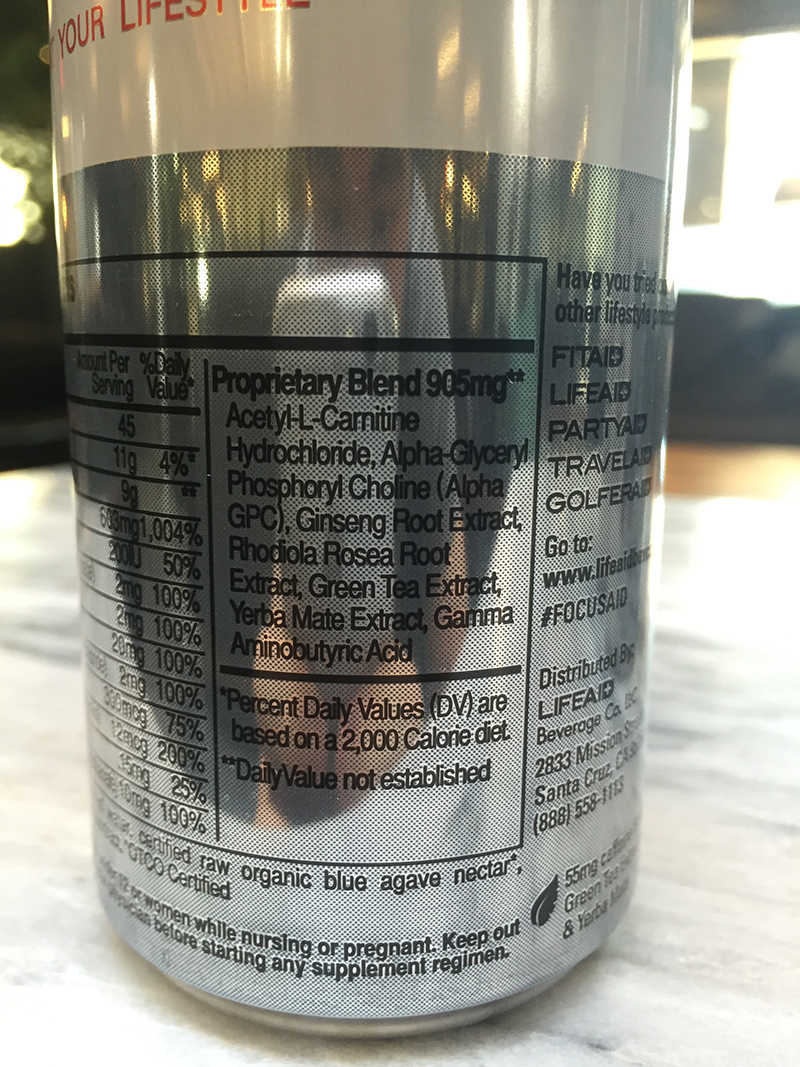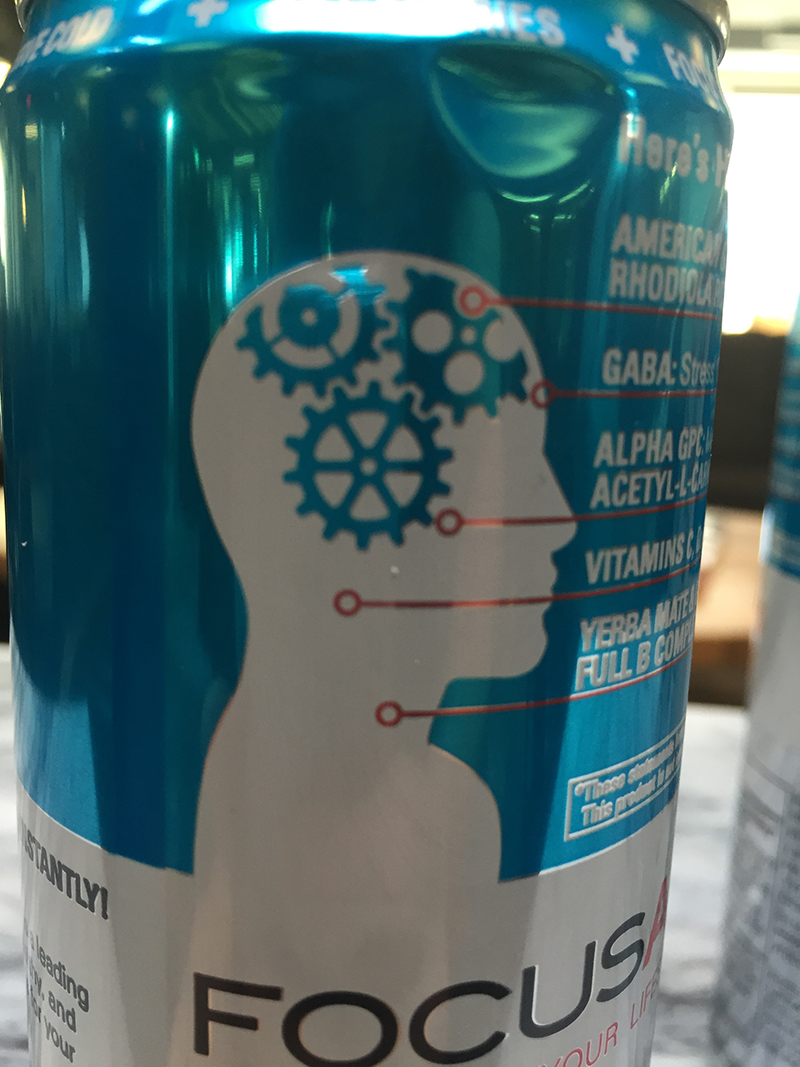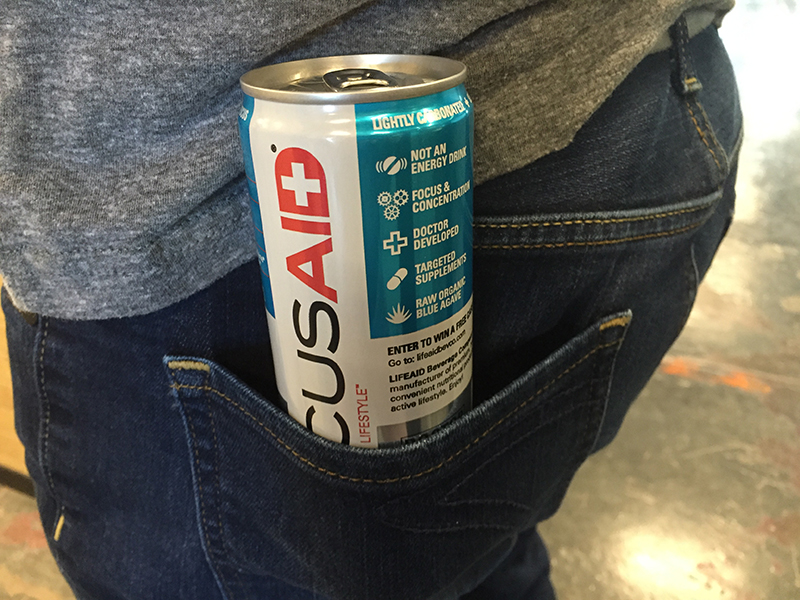Nootropic companies have focused their attention on capsules powders over the past few years, but more brain enhancing supplements now come in the form of drink mixes or even ready-to-drink cans and bottles. LifeAID — makers of popular sports supplement drinks like FitAID and GolderAID, and the raver’s favorite PartyAID — have recently entered into the market with their own nootropic-in-a-can: FocusAID.
FocusAID is now available, but is it a legit nootropic, or just another carbonated beverage with clever packaging? We were especially curious if the liquid form nootropic sped absorption and the perceived effects of certain ingredients as opposed to a capsule. Read below to see what the BrainWiz testers thought of this nootropic beverage.
Ingredients
FocusAID has 45 calories per can with 11 grams of carbohydrates, 9 grams of which are from sugar.
Vitamin C — 603 mg
Vitamin D — 200 IU
Thiamine — 2 mg
Riboflavin — 2 mg
Niacin — 20 mg
Vitamin B6 — 2 mg
Folate — 300 mcg
Vitamin B12 — 12 mcg
Biotin — 0.15 mg
Pantothenic Acid — 10 mg
Proprietary Blend — 906 mg
Acetyl-L-Carnitine Hydrochloride
Acetyl-L-Carnitine (also referred to as ALCAR) is one of the most studied and research-backed nootropics around. It can increase alertness, energy, and mitochondrial activity, which is why it’s sometimes marketed as a fat burner (though the fat burning effects of the amounts found in nootropics would be minimal at best). ALCAR also has neuroprotective properties and may help prevent damage to the brain that comes from excess alcohol consumption.
Alpha-GPC
One of the most bio-available forms of choline, an important neurotransmitter. We talk more about Alpha-GPC and why it’s becoming increasingly common in nootropic stacks here.
Ginseng Root Extract
Ginseng has long been touted for its cognitive-enhancing abilities. However, current and recent research suggests its most potent effects are related to its anti-fatigue properties, as reported by The New York Times and numerous science journals.
Rhodiola Rosea Root Extract
An adaptogenic herb with anti-fatigue (both mental and physical) properties, rhodiola is one of the most common “natural” nootropic ingredients in brain enhancing supplements. Read more about why rhodiola rosea is so popular and why it has so few reported side effects here.
Green Tea Extract
Yerba Mate Extract (55 mg caffeine from above two ingredients)
FocusAID’s source of natural caffeine, green tea and yerba mate extracts also contain ingredients like theanine that may enhance the stimulatory effects of caffeine. Research suggests yerba mate may also be a vasodilator and can help improve microcirculation in humans.
Gamma Aminobutyric Acid (GABA)
Gamma-aminobutyric acid (GABA) is a neuropsychotropic drug that functions as both a nootropic and as a tranquilizer by stimulating dopamine production. Dopamine plays a part in controlling flow of information in the brain while alleviating stress and anxiety. GABA itself has difficulty crossing the blood/brain barrier, and oral consumption is typically not very effective at increasing GABA concentrations in the brain.
Other ingredients: Carbonated water, certified raw organic blue agave nectar, natural flavors, citric acid, stevia extract
Note: The manufacturer lists valerian root and bacopa monnieri as highlighted ingredients of FocusAID on their homepage slider, but neither appears on the ingredient list for the supplement itself.
Usage Guidelines
This new LifeAID product is the perfect supplement to help you focus when you need it, keep your mind in flow, & help you recover from an intense day at work or school… Unlike energy drinks that are filled with artificial flavors & sweeteners, taurine, tons of sugar & added caffeine.
What Our Testers Say
“I’m actually a little more familiar with this company than I might want to admit (it has to do with EDM festivals and PartyAID — that’s all I’m saying). I’ve liked their products in the past, but I’ve never thought of them as more than lower-calorie sodas. FocusAID was pleasant tasting (when cold) and gave me a little kick at first sip, I think because I was getting some sublingual absorption of the caffeine. The actual nootropic effect is pretty mild, maybe noticeable just a little bit after lunch.” — Alexandra
“The drink didn’t taste as sweet as I expected, and it was really convenient and a nice break from coffee. I tried it in the morning as my day’s primary nootropic stack, and I didn’t get as much out of it as my other go-tos. However, I enjoyed drinking it with lunch or right after as an alternative to coffee. It might also not be a bad option for later in the evening, when you want a little boost while staying under 100 mg of caffeine.” — Wesley
“Look, this didn’t give me a crazy boost. It’s not a high-potency nootropic stack. But I liked it better than soda or the Diet Coke I’ll grab from the commissary during the afternoon. It’ll never be my primary nootropic supplement, but when I started to think of it like a drinkable booster shot to extend focus during a long day, I started to like FocusAID a little more.” — Ming
“I made the mistake of bringing a can to work and then letting it sit at my desk until it got warm. Let’s just say that first sip was…warm. But cold, it tastes pretty good, like something I’d want to drink after or during a workout. I felt a slight boost in focus and concentration, but overall that was pretty mild. I think I see this as a replacement for soda, not my favorite nootropic supplements.” — Chad
But How Does It Taste?
FocusAID’s manufacturer describes the drink as having a “Light Lemon Tea Flavor.” Our testers who have tried their products before — FitAID, PartyAID, etc. — felt FocusAID was slightly less sweet and had less of a heavy agave flavor than the other varieties. We didn’t think it tasted much like tea, though there are definitely tones of citrus.
Wesley described his first taste as “sort of like the chewable Flintstones vitamins I had as a kid, but in drinkable form” (note that he didn’t say this in a negative light). We would recommend drinking it very cold, as the drinking experience was not pleasant when having FocusAID at room temperature. If you’re serving it on ice, give the drink a second to sit to evenly chill.
BrainWiz Tips
- FocusAID contains 55 mg of caffeine. However, when combined with some of the other ingredients and 9 grams of sugar in FocusAID, it can feel like significantly more. Drink accordingly.
- Serve COLD for a tasty experience — this beverage did not taste good at room temperature.
- We don’t know the exact breakdown of FocusAID’s “proprietary blend” of nootropics, but at 905 mg spread across seven ingredients, we didn’t feel like there was an overabundance of any one. As such, we had some success stacking this with other nootropics, or drinking FocusAID with or after lunch for an additional afternoon boost.
- Cut with cold water if you have a lower tolerance for sweets or carbonation.
Supplement Summary
Our testers felt FocusAID was a refreshing beverage that could give them a slight focus boost, and that it was best when taken in the afternoon; as a morning nootropic supplement, most felt it was pretty mild. They enjoyed it when served ice cold, and it could be a lower-calorie replacement for sodas with the added benefit of some tried-and-true nootropic ingredients in small amounts.
If you enjoy LiveAID company’s other products, you’ll probably enjoy their take on drinkable nootropics.
The post Focus in a Can? Reviewing FocusAID by LifeAID Beverages appeared first on Brain Wiz.




No comments:
Post a Comment